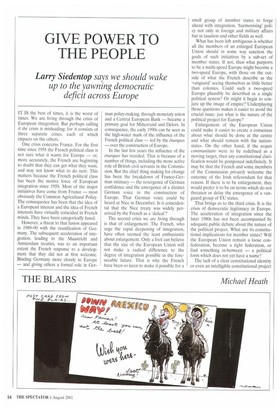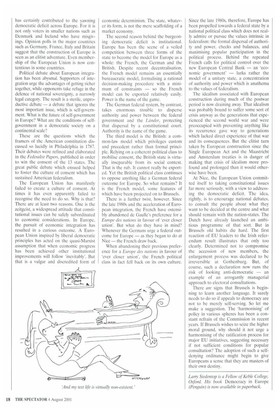GIVE POWER TO THE PEOPLE
Larry Siedentop says we should wake
up to the yawning democratic deficit across Europe
IT IS the best of times, it is the worst of times. We are living through the crisis of European integration. But perhaps calling it the crisis is misleading; for it consists of three separate crises, each of which impacts on the others.
One crisis concerns France. For the first time since 1958 the French political class is not sure what it wants for Europe — or, more accurately, the French are beginning to doubt that they can get what they want, and may not know what to do next. This matters because the French political class has been the motive force of European integration since 1958. Most of the major initiatives have come from France — most obviously the Common Agricultural Policy. The consequence has been that the idea of a European interest and the idea of French interests have virtually coincided in French minds. They have been categorically fused.
However, a threat to that fusion appeared in 1989-90 with the reunification of Germany. The subsequent acceleration of integration, leading to the Maastricht and Amsterdam treaties, was to an important extent the French response to a development that they did not at first welcome. Binding Germany more closely to Europe — and giving others a formal role in Ger man policy-making, through monetary union and a Central European Bank — became a primary goal for Mitterrand and Delors. In consequence, the early 1990s can be seen as the high-water mark of the influence of the French political class — led by the Marques — over the construction of Europe.
In the last few years the influence of the enarques has receded. That is because of a number of things, including the more active role of British civil servants in the Commission. But the chief thing making for change has been the breakdown of Franco-German intimacy — the resurgence of German confidence and the emergence of a distinct German voice in the construction of Europe. That German voice could be heard at Nice in December. Is it coincidental that the Nice treaty was widely perceived by the French as a 'defeat'?
The second crisis we are living through is that of enlargement. The French, who urge the rapid deepening of integration, have often seemed the least enthusiastic about enlargement. Only a fool can believe that the size of the European Union will not make a radical difference to the degree of integration possible in the foreseeable future. That is why the French have been so keen to make it possible for a small group of member states to forge ahead with integration, 'harmonising' policy not only in foreign and military affairs but in taxation and other fields as well.
What has been left ambiguous is whether all the members of an enlarged European Union should in some way sanction the goals of such initiatives by a sub-set of member states. If not, then what purports to be a multi-speed Europe might become a two-speed Europe, with those on the outside of what the French describe as the 'vanguard' seeing themselves as little better than colonies. Could such a two-speed Europe plausibly be described as a single political system? Or might it begin to conjure up the image of empire? Underplaying those questions makes it easier to avoid the crucial issue: just what is the nature of the political project for Europe?
Enlargement of the European Union could make it easier to create a consensus about what should be done at the centre and what should remain with the nationstates. On the other hand, if the acquis communitaire were to be redefined as a moving target, then any constitutional clarification would be postponed indefinitely. It may be that the French and some members of the Commission privately welcome the outcome of the Irish referendum for that reason. If there is to be enlargement, they would prefer it to be on terms which do not threaten or delay the emergence of a vanguard group of EU states.
That brings us to the third crisis. It is the crisis of democratic legitimacy in Europe. The acceleration of integration since the later 1980s has not been accompanied by adequate public debate about the nature of the political project. What are its constitutional implications for member states? Will the European Union remain a loose confederation, become a tight federation, or find something in-between — a political form which does not yet have a name?
The lack of a clear constitutional identity or even an intelligible constitutional project has certainly contributed to the yawning democratic deficit across Europe. For it is not only voters in smaller nations such as Denmark and Ireland who have misgivings. Opinion polls in the major countries such as Germany, France, Italy and Britain suggest that the construction of Europe is seen as an elitist adventure. Even membership of the European Union is now contentious in some countries.
Political debate about European integration has been abysmal. Supporters of integration urge the advantages of getting richer together, while opponents take refuge in the defence of national sovereignty, a narrowly legal category. The result is a sterile, unproductive debate — a debate that ignores the most important issue, which is self-government. What is the future of self-government in Europe? What are the conditions of selfgovernment in a democratic society on a continental scale?
These are the questions which the framers of the American constitution discussed so lucidly in Philadelphia in 1787. Their debates were refined and elaborated in the Federalist Papers, published in order to win the consent of the 13 states. The great public debate which ensued helped to foster the culture of consent which has sustained American federalism.
The European Union has manifestly failed to create a culture of consent. At times it has even apparently failed to recognise the need to do so. Why is that? There are at least two reasons. One is the zeitgeist, a widespread attitude that constitutional issues can be safely subordinated to economic considerations. In Europe, the pursuit of economic integration has resulted in a curious outcome. A European Union inspired by liberal democratic principles has acted on the quasi-Marxist assumption that when economic progress has been achieved other institutional improvements will follow Inevitably'. But that is a vulgar and discredited form of economic determinism. The state, whatever its form, is not the mere scaffolding of a market economy.
The second reason behind the burgeoning democratic deficit is institutional. Europe has been the scene of a veiled competition between three forms of the state to become the model for Europe as a whole: the French, the German and the British. Despite recent decentralisation, the French model remains an essentially bureaucratic model, formalising a rational decision-making procedure with a minimum of constraints — so the French model can be exported relatively easily. Power is the name of the game.
The German federal system, by contrast, takes enormous trouble to disperse authority and power between the federal government and the Lander, protecting that dispersal by a constitutional court. Authority is the name of the game.
The third model is the British: a common-law model which privileges custom and precedent rather than formal principle. Relying on a coherent political class to mobilise consent, the British state is virtually inseparable from its social context. That is the rub. It cannot really be exported. Yet the British political class continues to oppose anything like a German federal outcome for Europe. So what remains? It is the French model, some features of which have been projected on to Brussels.
There is a further twist, however. Since the late 1980s and the acceleration of European integration, the French have ostensibly abandoned de Gaulle's preference for a Europe des nations in favour of 'ever closer union'. But what do they have in mind? Whenever the Germans urge a federal outcome for Europe — as they began to do at Nice — the French draw back.
When abandoning their previous preference for a Europe des nations in favour of 'ever closer union', the French political class in fact fell back on its own culture. Since the late 1980s, therefore, Europe has been propelled towards a federal state by a national political class which does not really admire or pursue the values intrinsic in federalism: the formal dispersal of authority and power, checks and balances, and maximising popular participation in the political process. Behind the repeated French calls for political control over the new European Central Bank — an 'economic government' — lurks rather the model of a unitary state, a concentration of authority and power which is anathema to the values of federalism.
The idealism associated with European construction during much of the postwar period is now draining away. That idealism was probably bound to suffer some sort of crisis anyway as the generations that experienced the second world war and were preoccupied with preventing anything like its recurrence gave way to generations which lacked direct experience of that war and its consequences. But the elitist turn taken by European construction since the Single European Act and the Maastricht and Amsterdam treaties is in danger of making that crisis of idealism more profound and prolonged than it would otherwise have been.
At Nice, the European Union committed itself to taking constitutional issues far more seriously, with a view to addressing the democratic deficit. The idea, rightly, is to encourage national debates, to consult the people about what they want to be decided at the centre and what should remain with the nation-states. The Dutch have already launched an ambitious programme of that sort. But in Brussels old habits die hard. The first reaction of EU leaders to the Irish referendum result illustrates that only too clearly. Determined not to compromise the accession of new members, the enlargement process was declared to be irreversible at Gothenburg. But, of course, such a declaration now runs the risk of looking anti-democratic — an example of an arrogantly managerial approach to electoral consultations.
There are signs that Brussels is beginning to learn another language. It surely needs to do so if appeals to democracy are not to be merely self-serving. So let me make a suggestion. The 'harmonising' of policy in various spheres has been a constant refrain of the Commission in recent years. If Brussels wishes to seize the higher moral ground, why should it not urge a harmonising of the ratification process for major EU initiatives, suggesting necessary if not sufficient conditions for popular consultation? The adoption of such a selfdenying ordinance might begin to give Europeans a sense that they are masters of their own destiny.
Larry Siedentop is a Fellow of Keble College, Oxford. His book Democracy in Europe (Penguin) is now available in paperback.



























































 Previous page
Previous page